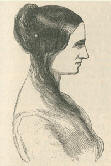|
1847 - New York City
Mary had developed a successful hydropathic practice..... Hiram, despite his continual distant slander, had become to Mary more of an ugly symbol of male dominance than an immediate threat. Mary had lived half of her life. ...The reality of Hiram both postponed and ensured this union (Mary Gove and Thomas Nichols). Because Mary admitted to having left her husband, the State of Massachusetts has granted a "Legal Separation for Voluntary Abandonment," but this designation did not allow either Hiram or Mary to remarry. As the victim of abandonment, only Hiram had the clear right to sue for divorce; and Mary doubted this would happen, for Quakers did not sanction divorce. The chains of this marriage did not stop her affair with Thomas, but they did enforce limits. Mary resolved that she would wait a full year before moving in with Thomas and abandoning all respect for appearances or law. ...A few months passed . And then, a
miracle. Mary learned that Hiram had fallen in love with another woman and
that he wanted a divorce. Suddenly, unexpectedly, Mary was free.

|